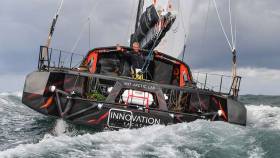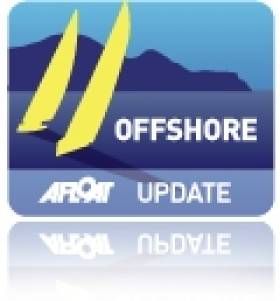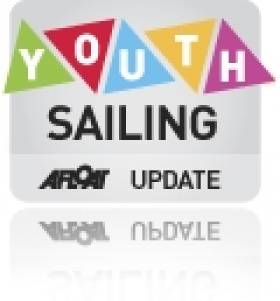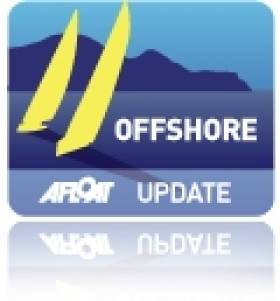Displaying items by tag: Open 60
Former Vendée Globe skipper Norbert Sedlacek on his Open 60 is sailing south of Ireland today on his way to the North-West Passage on his journey around the world.
Sedlacek's Open60AAL 'Innovation Yachts' officially crossed the starting line at 07:16:10 p.m. in ideal weather conditions and under the auspices of the World Speed Sailing Record Council to begin a record attempt on the five oceans.
Sedlacek has set a course for the Arctic Ocean, passing the Northwest Passage from east to west and then heading south to round Cape Horn for the first time.
He will then sail around Antarctica in the Southern Ocean and pass Cape Horn a second time before heading north back home to Les Sables d’Olonne.
Innovation Yachts is an Austrian-French shipyard designing and building unique customised racing and cruising yachts. The yard uses new trendsetting fully sustainable and recyclable materials to optimize quality, performance and the protection of the environment during and after construction.
The Open60AAL is the first 60’ which has been built in Les Sables d'Olonne, France. This revolutionary prototype launched in 2018 is made from volcanic rock fibre, balsa wood core and biocompatible epoxy.
The yacht represents the vanguard of a new generation of high-quality boats, very powerful, safe and, it is claimed, ecological.
If this record attempt is successful Norbert Sedlacek will be the first sailor ever who did a singlehanded, nonstop circumnavigation without assistance through all oceans including the Arctic and the Southern Ocean.
This challenge represents approximately 34,000 nautical miles and around 200 days at sea.
#Open60 - There was plenty of action on the water in and around Cork Harbour this afternoon (Sunday 12 July) as the Atlantic Youth Trust's IMOCA 60 Kilcullen Voyager took on the Alex Thomson-skippered Hugo Boss in a special challenge race as part of this weekend's SeaFest events.
Indeed, it's not every day Cork Harbour plays host to not one, but two of the world's highest performing ocean racing yachts - particularly one with a record-breaking offshore pedigree, and the other sailing with youth sail trainees taking up a once-in-a-lifetime opportunity to get on-deck experience at sailing's pinnacle.
Despite the relative lack of experience on the Irish boat, they certainly gave Thomson and crew a run for their money today, closing a significant gap to cross the finish line only a minute or so behind the professionals.
Hugo Boss well ahead of Killcullen, currently about 3 miles south of Roches Point @Seafest_ie pic.twitter.com/aW1L51l0Mm
— Gavin Deane (@gavinroyalcork) July 12, 2015#YouthSailing - A once-in-a-lifetime opportunity for young people to sail an Open 60 racing yacht around the Irish coast is now available thanks to MSL Ballsbridge Motors Mercedes-Benz and the Atlantic Youth Trust supporters club.
In total eight places are available for 18–to-24-year-olds to take part in two 'extreme' high-performance coastal voyages on board the Kilkullen Voyager. The boat captain for the voyages will be top Irish solo Figaro helmsman David Kenefick.
The first will see the yacht sail from Dun Laoghaire to Belfast to join the Tall Ships Festival from 29 June to 2 July. The second voyage will leave Belfast on the 5 July and finish in Cork on 11 July to coincide with the Ocean Wealth Conference and SeaFest.
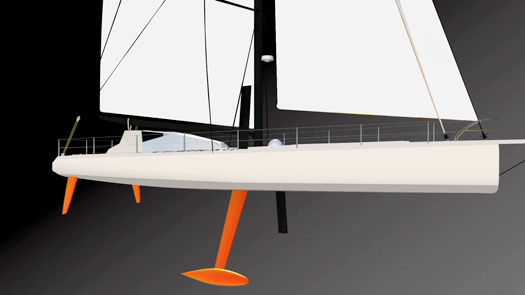
The Kilcullen Voyager is one of the fastest monohull yachts on the water today
Due to the yacht's high performance, sailing experience is required. Conditions on board will be challenging with little to no creature comforts found on other yachts. The benefit is that the Kilcullen Voyager is one of the fastest monohull yachts on the water today.
Speaking about the opportunity, Noel Rabbitte, Mercedes-Benz brand manager at MSL Ballsbridge Motors, said: “We are thrilled to be involved in this exciting, youth development initiative.
"Giving young people this opportunity is comparable to providing a safe environment for young people to drive a Formula 1 car for a weekend with a trained professional in the cockpit.”
No fee is being charged as the yacht has been made available by the Atlantic Youth Trust’s supporters network and the kind support of MSL Mercedes-Benz.
Anyone interested in taking part must submit an expression of interest form (available HERE) by 10am on Friday 26 June.
{youtube}rEbxOEEfeDE{/youtube}
Former Race Winners, VOR Vet & Lifeboat Coxwain To Mount Round Ireland Charity Challenge
#RoundIreland - Dragon's Den star Bobby Kerr and Wicklow farmer David Ryan will have to see some stiff competition in the Round Ireland Yacht Race in the form of former race winners, a Volvo Ocean Race navigator and a local lifeboat coxswain.
Teng Tools and Kilcullen Kapital have joined the Round Ireland with a state-of-the-art canting keel Open 60 racing machine. Their objective? To take line honours, challenge the record and raise funds for two charities.
The entry will be jointly skippered by the formidable pairing of Enda O’Coineen and Eamon Crosbie. Both have a long history with the race, ocean adventure, and challenges in general.
They will be joined by a strong crew including Alan Crosbie, VOR and Open 60 veteran Wouter Verbaak and Mark McGibney, coxswain of Dun Laoghaire RNLI's lifeboat.
The focus of the campaign is to raise awareness and funds for two worthy charities, Soul Of Haiti and Atlantic Youth Trust, under a special race committee chaired by Paddy Madigan.
The Soul of Haiti Foundation is an Irish registered charity established in 2007 by a group of entrepreneurs who were finalists in the Ernst & Young Entrepreneur of the Year Programme.
Upon visiting Haiti, these business people came together with the aim of applying their entrepreneurial skills and resources to create a positive impact on the lives of the people of Haiti.
The Atlantic Youth Trust is a youth development charity that will deliver a world-class educational programme on a purpose-built tall ship.
Young people from Northern Ireland and the Republic of Ireland will team up for exciting and challenging voyages to develop their teamwork, communication and leadership skills.
The challenge is formally being launched on Wednesday 25 June with a BBQ at the Royal Irish Yacht Club. Guests can enjoy live music, gourmet food and tours of the Open 60, which will arrive at 6.30pm to be paraded in by a bagpipe player!
Individual tickets are €45 or 10 for €400, with all proceeds going to the two charities. For more information visit VoodooKilcullen.com.
Hugo Boss Open 60 Stops Off At Cork Harbour Marina
#Offshore - The Open 60 Hugo Boss made a surprise visit to Cork Harbour Marina in Monkstown Bay at the weekend, giving some 50 local junior sailors a tour of the vessel - and hopefully inspiring their future in offshore racing.
Skipper Alex Thomson said he and his crew were not far off Land's End in Cornwall after a leak discovered in the starboard ballast tank required overnight repairs.
But rather than sail back to Falmouth, Thomson reckoned they could find a suitable deep-water berth on Ireland's south coast.
A few phone calls later from the team's business manager (and Corkonian) Stuart Hosford, and they had a place waiting for them in Monkstown Bay, which can boast of over eight metres of water at low tide - more than enough for a vessel of Hugo Boss' stature.
"We could not believe it when we found a welcoming committee on the dock when we arrived at 3.30am on Saturday," said Thomson.
"The marina owner, James O’Brien, was there to help us dock and some Monkstown Bay Sailing Club members took us up the Boson Guest House, where they had reserved rooms for us whilst we were still at sea."
After a hearty cooked breakfast, and a free lunch from Hassett's Bakery in Carrigaline, Thomson and crew found they were the "star attraction" in Monkstown "with a steady flow of visitors who just wanted to see the boat while we worked on it".
When the team hauled up the mainsail to check the rigging they inadvertently made a new addition to Cork Harbour's skyline, even blocking out the view of Cobh Cathedral!
But it wasn't all work for Thomson and company, as the skipper said Sandy Rimmington and other club members were on hand to help with repairs "and we were able to relax in the club on Sunday night, drinking stout until all hours with local sailors and the survivors from watching the Munster match in the afternoon."
Before the Open 60 departed yesterday (28 April) en route across the Atlantic to New York, Thomson described their impromptu visit to Cork Harbour as "one of those serendipitous incidents. We were lucky to be near Monkstown when we ran into a problem, rather than mid-Atlantic. What a great place to have to visit by accident!"
He also expressed his hope that "the next phase of development for the marina will go ahead and yachts such as ourselves will be able to use the facilities again in the future.
"With this development in place, Monkstown and Cork Harbour will be much more attractive to play host to a major international race. It is ideally located as a base and destination for offshore racing."



























